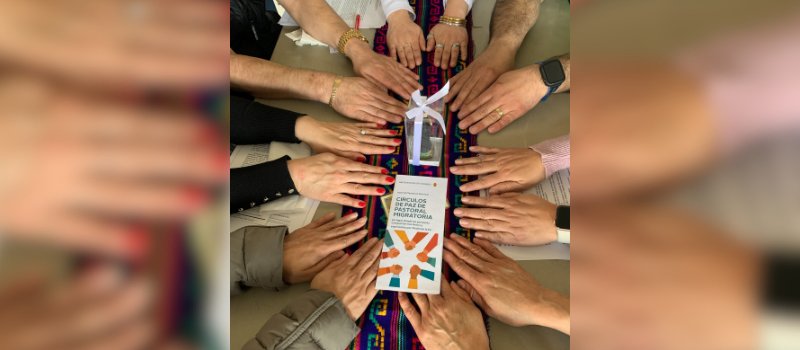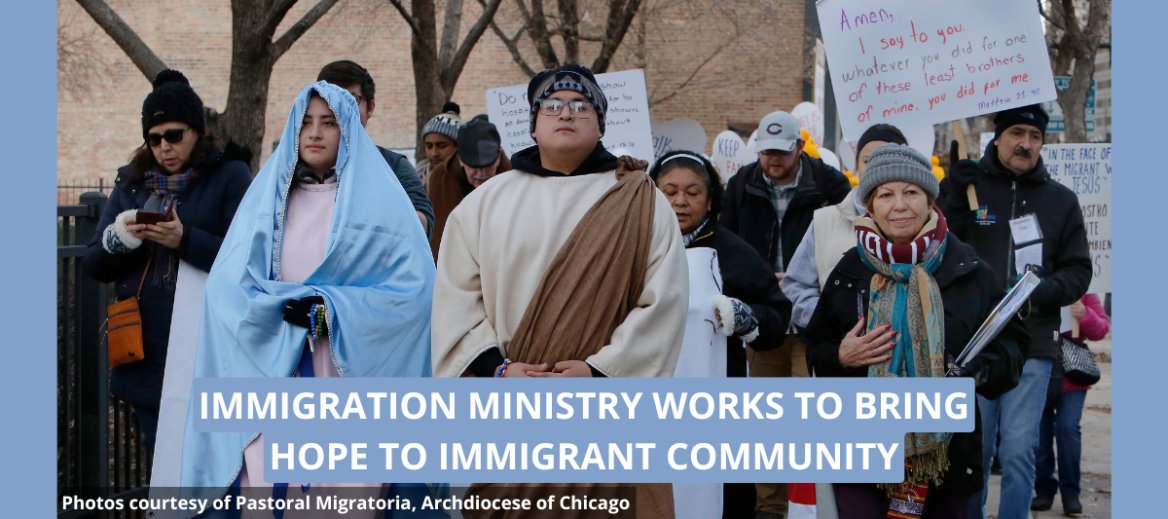By Sarah Rosland, Senior Coordinator for Local Immigration, Archdiocese of Chicago
I often hear the phrase, “tengo miedo” (I am afraid). When people say this, I search for the right response or a concrete answer, but I am left feeling powerless. After a couple of intense weeks of listening to the sentiments of our immigrant community members, I found myself asking God: “Where is hope?” One day, while I was preparing a prayer for a staff meeting, I came across the passage in Mark 6:50: “Take courage, it is I, do not be afraid.” I later learned that these words are repeated 365 times in the Bible. What better reminder of hope than knowing that God whispers to us each day: “It is I. Do not be afraid.” God is with us and God is HOPE. So, when people say, “tengo miedo,” I can respond with: “Do not be afraid, God is with you.” But then it became a question of how can we get this message of hope out to all.
Currently, many immigrant families are facing the threat of deportation and family separation. This is a reality well-known to many in the immigrant community, but it nonetheless left many, including myself, in shock when it became the headlines of local and national news for weeks on end. I was left thinking: “How can I be in solidarity with the immigrant community?” Luckily, I have the privilege to work alongside immigrant lay leaders via my work with the Archdiocese of Chicago’s Hispanic immigration ministry, Pastoral Migratoria.
Introduced in 2010, Pastoral Migratoria invites Hispanic immigrants to respond to their baptismal call to holiness and engage in service, accompaniment and justice actions in their parish communities. With the support of more than 200 lay leaders active in this ministry, we quickly turned our efforts to listening to parish leaders — seeking to understand what people were feeling and how the church could best respond pastorally to support families facing deportation and separation.
While we quickly began distributing Know Your Rights information and resources and working with lawyers and community organizations to conduct Know Your Rights workshops in parishes, I began to understand the profound need for a more pastoral response. We asked ourselves: “How can we create sacred spaces where people can join together to speak about these difficult realities many are facing?” We turned to the faithful practice of Peace Circles, creating specific Pastoral Migratoria Peace Circles. Peace Circles are a pastoral exercise that invites people to share their challenges, fears and hopes in a safe and trusting environment. This practice leads the person to analyze experiences through their faith in a compassionate environment. These spaces allow us to speak freely about the emotions we feel to help us understand how God speaks to us through the movements of our hearts.
In the face of uncertainty and fear, our immigrant families and myself continue to search for peace and hope through faith and solidarity. While resources and legal information remain important, the power of a church united in solidarity — one that pastorally accompanies to uphold the dignity of every person in our communities with a preferential option for the most vulnerable — cannot be overlooked. I pray that this difficult time serves as an opportunity to become a more united church of the people who stand in solidarity to offer not only resources and information but also the unwavering message of hope: “Do not be afraid, God is with you.”

Pastoral Migratoria, a ministry of the Archdiocese of Chicago, invites immigrant families to live out their faith through service, advocacy and pastoral accompaniment. Franciscan Sister of Perpetual Adoration Katie Mitchell collaborates with Pastoral Migratoria through Cabrini Ministries at Holy Name Cathedral — a ministry that provides outreach and support to newly-arrived migrants seeking safety and stability in the United States. Through this partnership, Cabrini Ministries and Pastoral Migratoria work together to offer pastoral care, advocacy and resources for immigrant families in need. For Sister Katie, this work is a blessing: She witnesses the face of Christ in those she serves.

